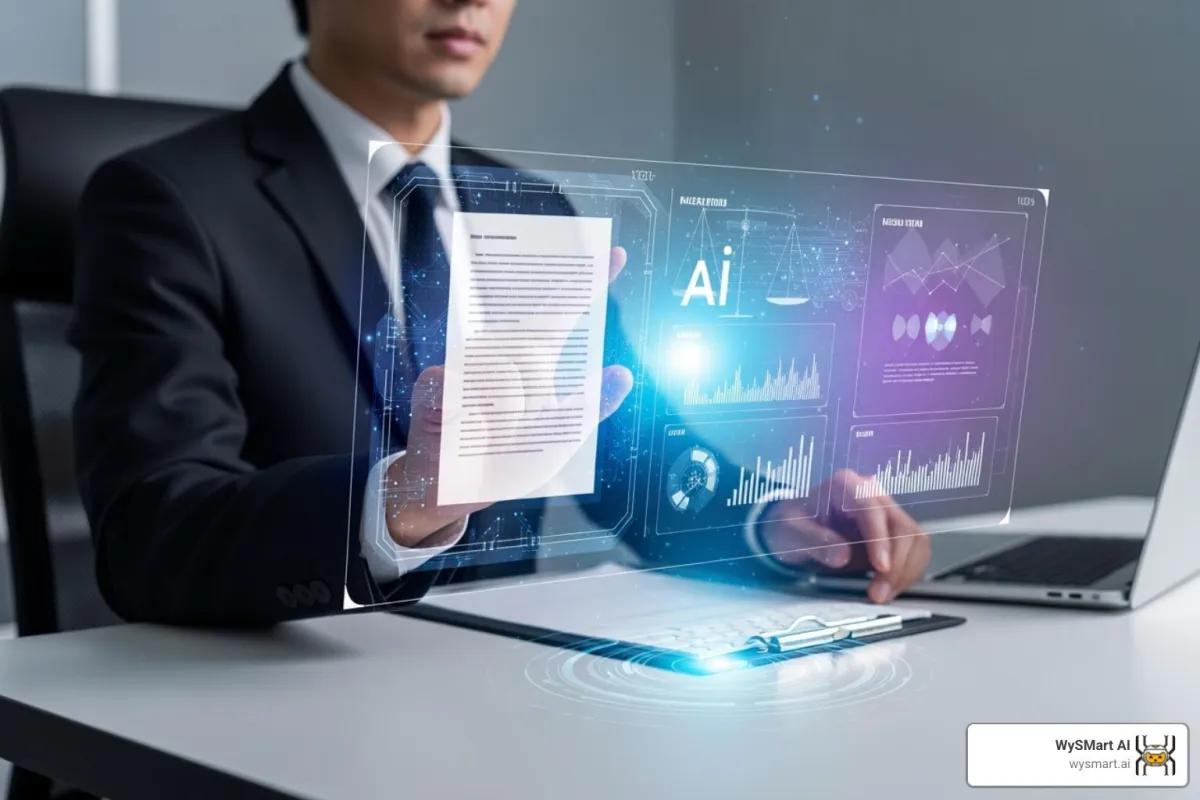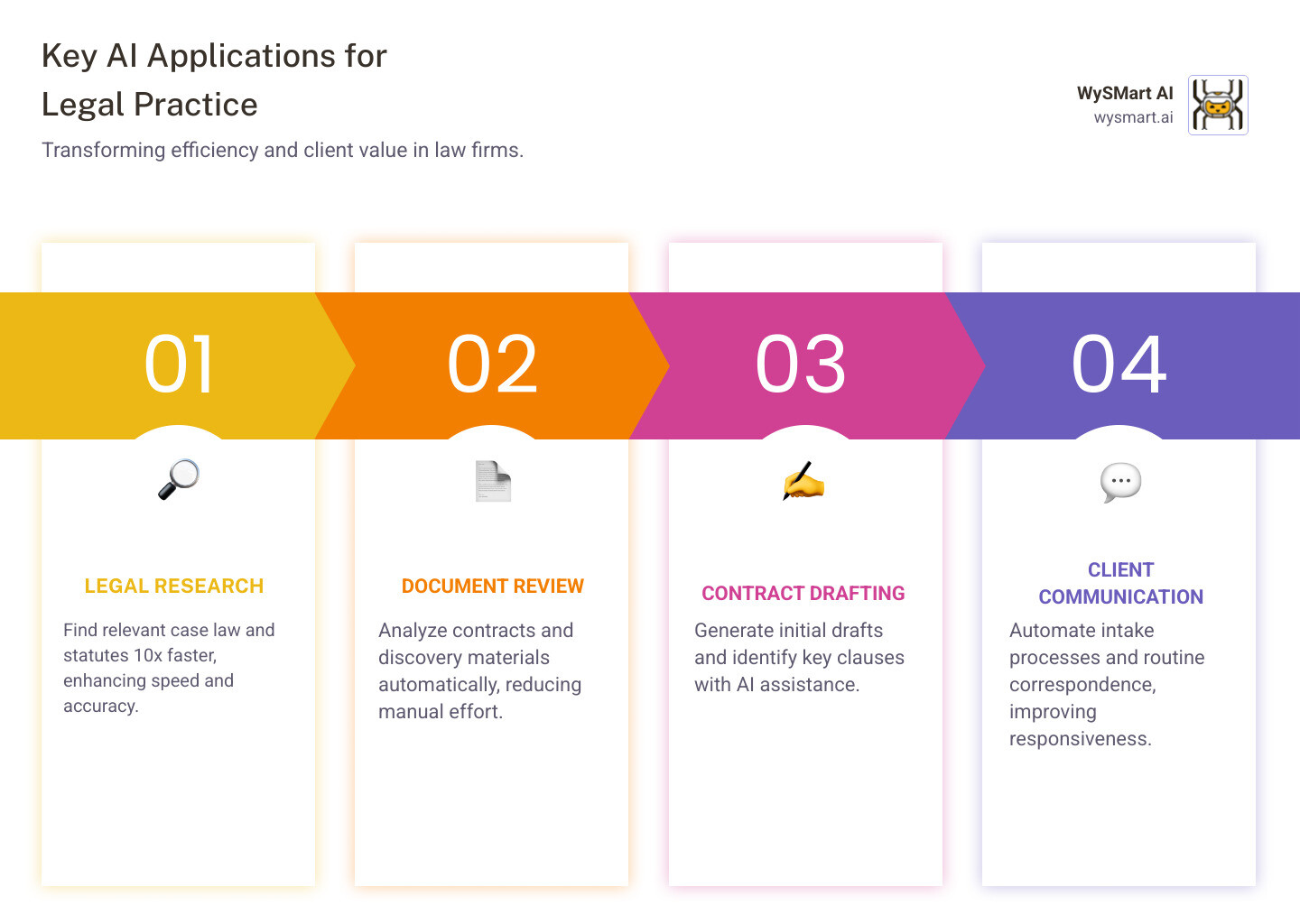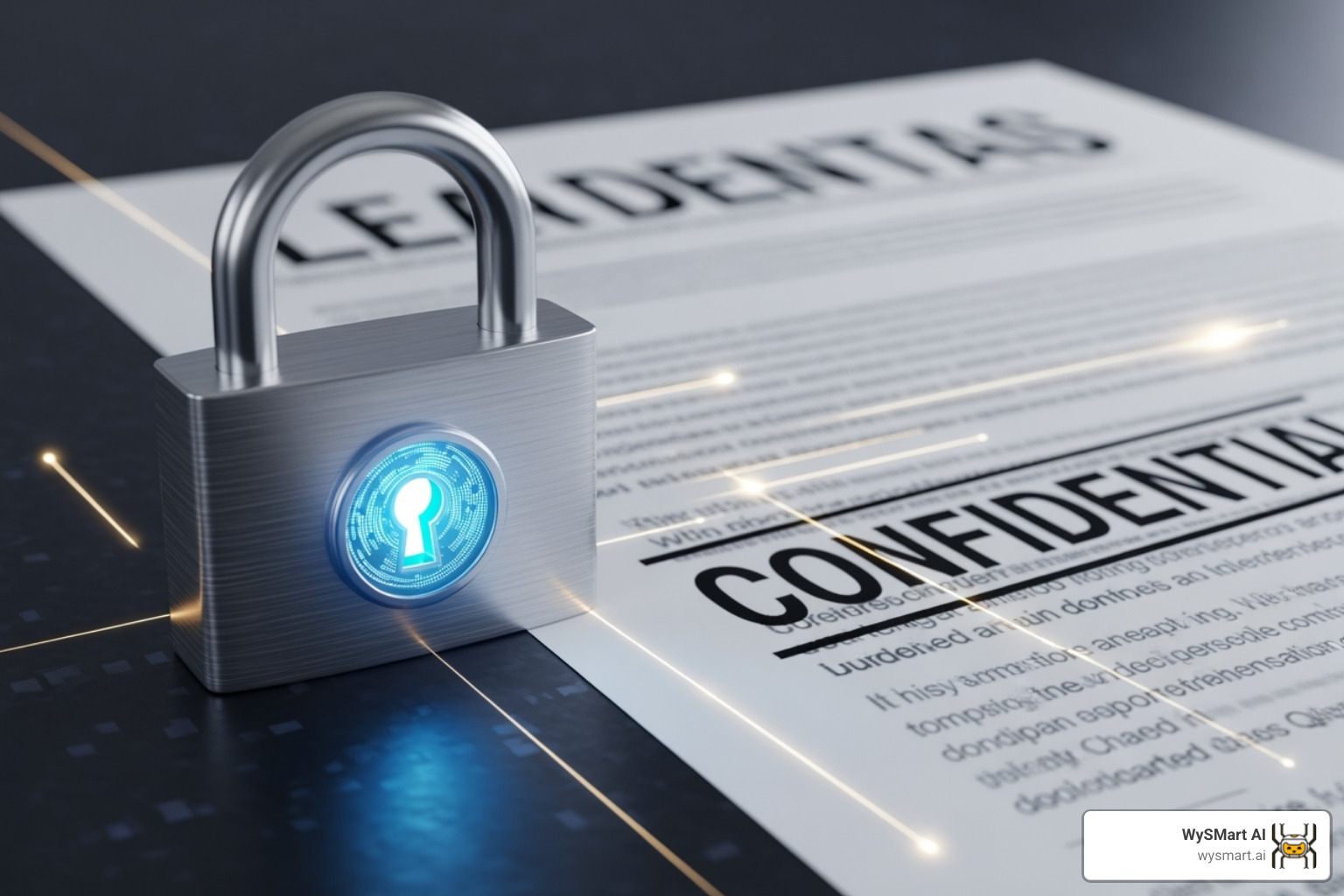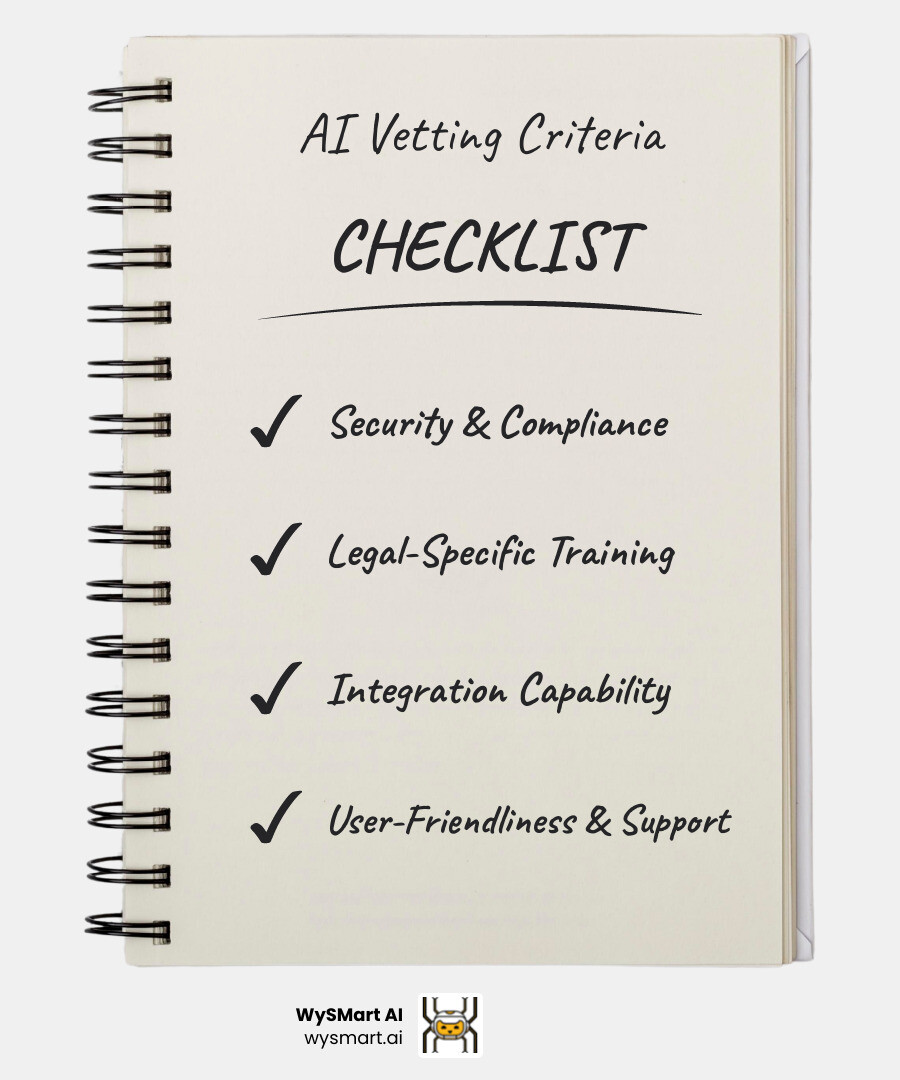
Your AI Legal Assistant: A Guide to Transforming Your Practice
The AI Revolution is Here—Is Your Firm Ready?
AI for legal practice is rapidly changing how law firms operate, research cases, and serve clients. The legal profession is experiencing a seismic shift, with nearly three-quarters of lawyers planning to use generative AI and 79% of legal professionals already using it in some capacity. The technology promises productivity gains of over 100 times, reducing tasks that once took hours to mere minutes.
This change isn't just about speed; it's about reimagining legal service delivery. Key applications include:
Legal Research: Find relevant case law and statutes faster.
Document Review: Analyze contracts and findy materials automatically.
Contract Drafting: Generate initial drafts and identify key clauses.
Client Communication & Case Management: Automate intake, correspondence, and deadlines.
Clients now expect faster, higher-quality work from AI-enabled firms, and courts are taking notice, with over 25 federal judges requiring disclosure of AI use. The reality is clear: AI adoption is no longer optional. However, it comes with risks, as even professional tools can produce incorrect information 17-34% of the time. Ethical obligations around supervision and confidentiality remain paramount.
As the founder of WySMart.ai, I've seen how strategic automation transforms businesses. The principles of successful AI for legal practice adoption—careful tool selection and ethical implementation—are universal.

The AI Advantage: Boosting Efficiency and Redefining Client Value
AI for legal practice is more than a new software tool; it's a brilliant research assistant that processes mountains of information in minutes. Law firms are seeing tasks that once took 16 hours completed in just 3-4 minutes—a productivity gain of over 100 times for certain workflows.

Beyond speed, AI brings improved accuracy. By handling repetitive, high-volume tasks prone to human error, it makes your work more consistent and reliable. This frees your team to focus on complex analysis, strategic thinking, and building stronger client relationships. As a result, clients now demand the higher quality and more responsive service that AI makes possible.
At WySMart.ai, we see this across all professional services. Just as AI revolutionizes legal work, our tools automate marketing and client engagement. When your website design services and local SEO run on autopilot, your team can focus on practicing law while the firm grows. More info about WySMart's AI-powered services.
From Billable Hours to Billable Value
The traditional billable hour is facing an identity crisis. When AI does in minutes what once took hours, how do you justify the old billing model? The answer is to shift toward value-based billing. Clients pay for your expertise and results, not just your time. AI helps you deliver those results faster and more accurately.
This shift benefits everyone. Clients get better outcomes at competitive prices, and your firm becomes more efficient, able to handle more cases. Think of it like a surgeon using a laser instead of a scalpel—the value is in the outcome, not the tool. AI for legal practice follows the same principle. Firms that accept this mindset will gain a significant competitive advantage.
Automating the Mundane: Key AI Applications in Your Daily Workflow
The magic of AI for legal practice is its ability to take over mind-numbing tasks. Instead of spending hours on legal research, AI can pinpoint relevant precedents in seconds. For document review and e-findy, it can sift through millions of documents, identifying key terms with an accuracy that often surpasses human reviewers. AI also excels at contract analysis, spotting risks, and drafting initial motions or wills with consistency.
Even routine client communications and case management are streamlined. AI-powered chatbots can handle initial intake, while other tools organize facts and track deadlines automatically. As The New York Times noted, AI's impact is accelerating. Firms that delegate the heavy lifting to AI will dominate their markets. This connects to what we do at WySMart.ai—our automated customer communication systems help firms maintain crucial client connections without overwhelming staff.
Navigating the Risks: A Guide to Ethical AI for Legal Practice
While AI for legal practice offers transformative power, it also introduces new risks. The legal profession's foundation of trust, accuracy, and ethics requires careful navigation of these challenges. With real people and consequences at stake, ethical obligations, professional responsibility, and data privacy are not just checkboxes—they are paramount.

The challenge isn't whether to adopt AI, but how to do so responsibly. Think of AI as a fast but overconfident research assistant; you wouldn't rely on it without proper supervision and verification.
The "Hallucination" Problem: Ensuring Accuracy in AI-Powered Legal Research
AI systems can "hallucinate," confidently presenting false information as fact. This was highlighted when a New York lawyer was sanctioned for citing fictional cases invented by ChatGPT. The AI created entire fake precedents, and the lawyer's failure to verify them led to professional embarrassment.
This isn't just a problem with general-purpose AI. A Stanford RegLab study found that even AI systems designed for legal research produce incorrect information at alarming rates (17-34% of the time). These AI hallucinations include inaccurate citations and entirely fictional cases, both of which can be professionally devastating.
This doesn't mean AI is useless; it means lawyers must accept their duty of verification. Every AI-generated result needs rigorous human oversight by a qualified attorney. For more on this, see the Stanford study: Hallucination-Free? Assessing the Reliability of Leading AI Legal Research Tools.
Upholding Your Ethical Duties: Confidentiality, Bias, and Supervision
The ethical landscape of AI for legal practice requires careful navigation. Client data security is central. When you upload client information to an AI, you risk exposing it. Does the provider use your data for training? Where is it stored? Using a tool that compromises attorney-client privilege is a serious ethical breach.
Algorithmic bias is another challenge. AI learns from historical data, and if that data is biased, the AI will perpetuate it. Furthermore, the duty of competence now includes understanding AI's capabilities and limitations.
Most importantly, lawyers have a duty of supervision over all AI-generated work. Bar associations in California, New York, and Florida have emphasized that lawyers remain fully responsible. With over 25 federal judges now requiring AI use disclosure, transparency and accountability are non-negotiable.
At WySMart.ai, we build data security and compliance into our AI-powered marketing services because we understand these responsibilities. For detailed legal guidance, refer to the California Bar guidance on AI.
Choosing Your AI Toolkit: A Strategic Framework for Law Firms
Not all AI for legal practice tools are created equal. Selecting the right one is a strategic decision that impacts efficiency, security, and ethical compliance. Think of it like hiring a new team member: you need to check their credentials and ensure they fit your firm's needs. At WySMart.ai, we advise clients to start with strategy, not shiny objects.

Step 1: Identify Your Firm's Biggest Time Sinks
Before researching tools, audit your firm to find where hours are lost. Are paralegals drowning in manual contract reviews? Is your team bogged down by scheduling and data entry? These document-heavy processes and administrative burdens are prime targets for automation. Knowing which tasks consume the most time reveals your potential return on investment before you spend a penny.
Step 2: Vet Your Tools for Security and Compliance
This is where many firms go wrong. A data breach isn't just embarrassing; it can be career-ending. Scrutinize vendor privacy policies. Does the company use your confidential data to train its AI? If so, walk away. Professional-grade legal AI tools must guarantee data privacy. Also, consider data storage jurisdiction and ensure the tool has robust access controls and audit trails to protect your clients and your practice.
Step 3: Fostering Adoption and Measuring ROI
Even the best tool is worthless if your team doesn't use it. Change management is key. Start by creating a firm AI policy that outlines acceptable use, confidentiality rules, and the mandatory duty of human oversight. Provide thorough team training on the tool's capabilities and limitations. Use pilot projects to test a tool on a specific task, gather feedback, and demonstrate success before a firm-wide rollout. Finally, measure your ROI by tracking time savings, error rates, and client satisfaction scores against pre-implementation baselines.
While AI streamlines your internal operations, your firm still needs clients. That's where our AI-powered website design and client acquisition tools come in. We help law firms attract the right clients through SEO and conversion-focused design. Get an AI-powered website to streamline client intake and create a complete growth system.
The Future of Law: What to Expect from AI for Legal Practice
The integration of AI for legal practice is a fundamental change, reshaping the profession's DNA. We're witnessing a complete reimagining of how legal services are delivered. Job roles are evolving, legal education is adapting, and access to justice is expanding as AI makes legal services more efficient.

The future is about humans and AI working together to achieve an impact neither could accomplish alone.
Augmentation, Not Replacement: The Evolving Role of Legal Professionals
Will AI replace lawyers? The consensus is a resounding no. Instead, AI is becoming the ultimate legal collaborator. Like calculators for mathematicians, AI frees legal professionals from tedious work to tackle more complex problems. It automates document review and research, but it can't exercise judgment, build client relationships, or craft winning strategies.
Lawyers are transitioning from task-doers to strategists, and we're seeing new roles like the "legal prompt engineer" emerge. Paralegals are also evolving, moving from manual data extraction to supervising AI tools. This shift increases capacity across the board, allowing firms to handle larger caseloads without sacrificing quality.
The AI-Savvy Lawyer: The Future of Legal Education and Skillsets
The "AI-savvy lawyer" understands how to harness technology to serve clients better. Tech competency is becoming as essential as legal research skills. This means being fluent in prompting AI, interpreting its outputs, and integrating it responsibly into workflows.
Given the pace of AI development, continuous learning is essential for survival. Law schools are adapting curricula to include legal tech and AI ethics. Most critically, lawyers need improved critical thinking skills to evaluate AI-generated information, identify potential hallucinations, and exercise ultimate professional judgment. As Harvard Law School's research indicates, the implications are profound. The future belongs to lawyers who master both law and technology. Explore more here: The Implications of ChatGPT for Legal Services and Society.
At WySMart.ai, we understand this balance. Just as lawyers leverage AI for legal outcomes, we help businesses use AI-powered marketing to achieve unprecedented growth.
Frequently Asked Questions about AI in Legal Practice
Here are answers to the most common questions we hear from law firms considering AI for legal practice.
Can AI give legal advice?
Absolutely not. AI is a powerful research and drafting assistant, but it is not a licensed attorney. It lacks professional judgment, cannot form an attorney-client relationship, and doesn't carry malpractice insurance. You remain solely responsible for any advice given to clients, and all AI-generated content must be reviewed and validated by a qualified lawyer.
Will AI replace lawyers or paralegals?
No, AI will make legal professionals more valuable. The consensus is that AI augments human capabilities, not replaces them. It handles repetitive tasks, freeing lawyers and paralegals to focus on high-value strategic work that requires empathy, critical thinking, and ethical judgment. This is a job evolution, not a job displacement.
How can my small law firm start using AI?
Start strategically. First, conduct a workflow audit to identify your most repetitive, time-consuming tasks. Next, research professional-grade AI tools designed for those specific legal tasks, avoiding consumer chatbots for sensitive work. Finally, launch a pilot program with clear usage policies and mandatory human review. Measure your results to prove ROI and guide future expansion.
At WySMart.ai, we apply these same principles of strategic AI implementation to help small businesses grow. While we focus on AI-powered marketing and client acquisition, our approach of careful selection and continuous optimization is what successful law firms need to integrate AI into their practice.
Conclusion: Partner with AI to Build a Smarter, Faster Firm
The legal profession stands at a pivotal moment. AI for legal practice has moved from fiction to reality, delivering remarkable productivity gains and enabling lawyers to focus on high-value strategic work. Success isn't about adopting every new tool; it's about strategic implementation that prioritizes ethics, security, and human oversight. When you get this balance right, AI becomes your most reliable assistant.
The firms that will thrive are those that combine legal expertise with smart technology. They automate the mundane while strengthening client relationships and exercising careful professional judgment.
At WySMart.ai, we understand this balance perfectly. While you revolutionize your legal practice with AI, we can revolutionize how clients find you. Our done-for-you AI toolbox handles everything from SEO and website design to reputation management, ensuring a steady stream of new clients.
AI helps you serve clients better, and we help those clients find you in the first place. The future belongs to firms that think strategically about technology—both in their practice and their growth. Partner with AI for your legal work, and partner with WySMart.ai for your client acquisition. Book your free findy call today to see how we can help you thrive.